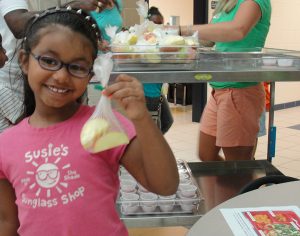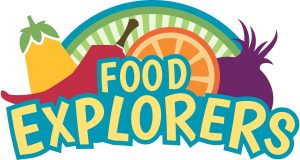
As parents and students crowded the halls of Rockingham County Schools for Open House, they were greeted by a host of healthy new lunch menu items.
“That’s so good!” said Lizzy Eychner, a Rockingham County student, as she tried the new Apple Dunkers her cafeteria will be offering this year.
The Open House was the kickoff to Food Explorers, a research partnership between the UNC Center for Health Promotion and Disease Prevention (HPDP), Rockingham County Schools, and Chef Cyndie Story. The program is funded by Blue Cross and Blue Shield of North Carolina Foundation and the Reidsville Area Foundation.
Food Explorers is a social marketing campaign, and is designed to promote healthy lunch menus and increased fruit and vegetable consumption at school. The campaign is deployed in tandem with upgrades to school cafeteria equipment, new fruit and vegetable recipes and child nutrition staff training.
“Interventions aimed at changing school food in the past have not focused on marketing the changes to kids, parents, and school staff,” said Linden Thayer, a doctoral student in nutrition and policy at the Gillings School of Global Public Health and the project manager of the study. She added that this often means that school lunch programs lose student participation because students and parents are upset by unsolicited menu changes.
“We focus on selling the idea of changes to the school lunch menu to kids, teachers, and parents to try to prevent backlash and promote the new healthy options,” said Thayer.
So far the program has been a hit among students, parents and staff alike.
Third and fourth grade students in the program will be issued an Explorers Passport at the beginning of the year, and new fruit and vegetable trading cards every week. When the student tries one of the 39 new fruits and vegetables offered in the lunchroom, he or she will receive a stamp in their passport. Students will have a chance to review each new food to determine their favorites. They can become Master Explorers and earn rewards if they participate in the passport program and trading card game and try new food throughout the school year.
“We believe the Masters Explorers incentive program will significantly increase student consumption of fruits and vegetables,” said Thayer.
The research team is led by Alice Ammerman, Ph.D., director of HPDP and a professor of nutrition at the Gillings School of Global Public Health, and Thayer. Seth Noar, Ph.D., and Heidi Hennink-Kaminski, Ph.D., from the School of Journalism and Mass Communication, will be leading the social marketing portion of the program. Undergraduate and graduate students from both schools are also working on the project.
The research team spent 9 months talking with students, parents and teachers about how to structure the program.
“We combined data gathered from focus groups with 4th and 5th grade students, and in-depth interviews with parents, teachers, administrators, and school lunch staff in Rockingham,” Thayer said. “We tested several campaign ideas with students in focus groups and then used the focus group feedback to develop the final project idea.”
Students who bring lunch from home will be able to participate in the Food Explorers program by taking free samples of all new foods. However, Thayer said one of the program’s goals was to increase interest in school lunches.
“An increase in participation in school lunch would be a first because previous school meal programs have all resulted in reduced participation resulting in a loss of money to the lunch program,” Thayer said.
The Food Explorers program will continue until the spring, and researchers will begin to gather follow-up data to determine the program’s impact in April 2014.
For more information, contact Sonya Sutton, HPDP Communications Specialist, at ssutton@unc.edu; 919-966-4118.
Zachary Freshwater
